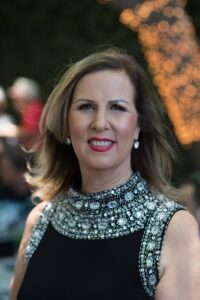 Protocol is a rather complex profession carrying great responsibility. Dealing with the highest world leaders usually means plenty of delicate issues, unforeseen circumstances and moments of severe diplomatic consequences. 50 years of protocol service in the Middle-East where even women are obliged to fulfill two years of mandatory military service – sounds like a real challenge to all.
Protocol is a rather complex profession carrying great responsibility. Dealing with the highest world leaders usually means plenty of delicate issues, unforeseen circumstances and moments of severe diplomatic consequences. 50 years of protocol service in the Middle-East where even women are obliged to fulfill two years of mandatory military service – sounds like a real challenge to all.
Half a decade at the legislative branch of the Israeli government called the Knesset – is an accomplishment anyone would be proud of – and to achieve it all as a woman deserves recognition.
Miri Yakin, former Knesset Chief of Protocol, may righteously be considered a role model to all women out there to prove that when there is a will, there is a way. Even in a men’s world.
Q: What were the triggering points in your life when you decided for protocol? What was your mission?
Before we begin, let me tell you about my family background. Although I live in Israel, my parents were born in Transylvania under the Austro-Hungarian regime. I remember that at home we used to speak in Hungarian in the first years of my childhood and later on – due to the political changes we had to learn Romanian as it became the official language in Transylvania, too.
My late father, God bless, him, always referred to Hungary as his dear homeland and Israel as his dear country. He would tell us amazing stories about his hometown. And I still remember the taste of the famous Goulash soup and Dobos cake!
Q: How did you find yourself in the Knesset?
I began my career as a student there. First, I was working as a tour guide for Hebrew, English and French-speaking visitors, including local and international VIPs: heads of state, prime ministers, members of the Parliament and multinational organization leaders. Later, I was appointed Head of the Knesset Officer’s Bureau and was in charge of security of all ceremonies and events taking place in- and outside of the Knesset headed by the Knesset’s Speaker.
Then I got promoted to Knesset Events Officer. My highest rank was upon retirement, Brigadier General (there are only six women in this senior rank – five at the Israel Police and myself, being the only one within the Knesset Guard responsible for Knesset security).
As Events Officer ceremonies were removed from the long list of responsibilities and a new position was created for dealing with ceremonies only. Further down the road I was appointed Head of Ceremonies where I established the Ceremony and Protocol Division.
This position included planning, organisation, management and production of all ceremonial, official and public events taking place both in- and outside of the Knesset.
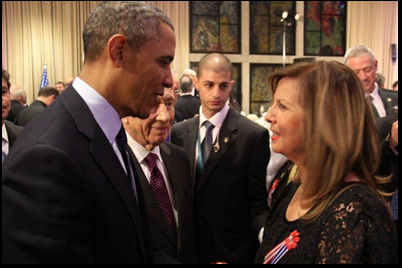
They were usually hosted by the Knesset Speaker, ministers and other Knesset members with participation of guests arriving from all spheres of society, ranging from the simple citizens to Heads of State and government, and also foreign Speakers of the House, leaders of multinational organisations, parliamentary delegations and the executive officials.
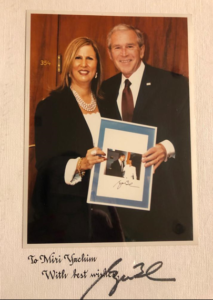
We conducted around 150 events every year, like exhibition openings, official dinners or ceremonial funerals as well. Protocol Division has been assigned to liaise with other departments and divisions and with various organisations and institutions in Israel and around the world. Our daily job was to contact Presidential Residences, Prime Minister’s Offices, Ministries and other institutions such as Yad VaShem and many more.
The other area of responsibility was for me to accompany the Knesset Speaker on his foreign travels and coordinate his or his delegate’s participation at international official and public ceremonies.
Current President of the state of Israel, Rivlin,
receiving a gift from Speaker Edelshtien before his declaration of allegiance at the Knesset Plenum
Why did I choose this position?
Well, first of all, I liked the fact that it is an executive position requiring high level of sensitivity and responsibility at the level of excellence under all circumstances. Secondly, the opportunity to be able to engage with the highest-ranking officials was appealing to me: the privilege of meeting world leaders – presidents, kings, prime ministers and parliament speakers from around the globe was a truly unique opportunity I did not want to miss out and kept me in the position for five decades!
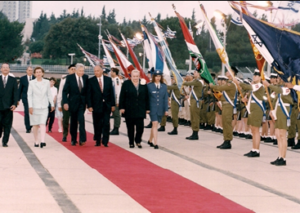
My real motif of entering the world of diplomacy and protocol was me thinking that I this position was made just for me! My whole personality complemented by diligence at work with attention to detail as handling severe responsibility and authority set by clear rules of protocol – with added the glamour of the ceremonies – just simply seemed irresistible to me at the time me. I must admit I do enjoy the officialism, the dignified decorum and elegance.
Q: We are living in a technology-run society. In your experience, how did it shape the world of protocol, and particularly the procedure in the Knesset?
Advanced technology enables easier, faster and more user-friendly access to various fields: sound, lighting, translations, photography, teleprompters, video mapping, video conferencing, Zoom, projecting presentations, images and sketches, e-mails, guest lists and seating software, various segmentations and statistical analyses.
The internet-led world allows us to use multimedia in social networks and hold international ceremonies online. However, we had to learn on the job how to communicate and respond in a rapid yet diplomatic manner.
The Knesset has recently upgraded all of its technology and internet infrastructures, through which it optimally conducts video conferences. It operates a dedicated television channel broadcasting directly its regular sessions, special assemblies marking national events and special ceremonial sessions with and in honor of international state officials.
Q: 50 years of service in protocol. How do you evaluate your legacy? What are you most proud of? Looking back, is there anything you would do different?
I am proud to have left the Knesset a legacy that will serve the Speaker and the Ceremony and Protocol Division for many years to come. My legacy is now extracted to the size of a book that was recently published on Knesset protocol listings ceremony procedures, relevant legal terms law and Israel’s state protocol precedence.
Another achievement I am very proud of is that most of the events I led over the years were merely executed by the Protocol division not having to outsource third parties, production companies. This resulted in not only significant savings in public funds but also in developing professional human work power within the Knesset.
I was delighted and content to retire and leave a record of zero technical and diplomatic faults. The division successfully completed numerous complex events – contributing to the improvement of the Knesset’s prestige and image in Israel and abroad. I am proud to say that our Events Division has become a role model for other official institutions in Israel.
Had I stayed in office, I would have further upgraded the division’s work and interfaces within and outside the Knesset with other advanced technologies, for instance, establishing a IT solution enabling real-time viewer reactions or questions.
Q: For centuries, the world of diplomacy had been dominated by men. Dealing with protocol issues at the highest level, as Chief of Protocol at the Knesset, what were your experiences as a woman? What may be the competencies and skills of women in protocol and in diplomacy that men may not possess and can make their career successful?
Well, in fact, the percentage of women working at the Knesset is higher than that of men and there are many senior employees in key positions. The Knesset Secretary General, the Head of HR and that of Foreign Affairs, many committee leaders, and the Chief of Protocol, the Director of the Visitors’ Center and all women!
When I first started working, it was difficult for me to move up on the ladder as most operational positions and ranks were assigned to men, and mainly administrative posts were held for women. Even when I felt the time has finally come for my recognition and reward, the process itself was taking longer than I expected and I often had to fight to demand what I was due.
Luckily, over the past two decades the Speakers was supporting the promotion of women and when he appointed me Chief of Protocol, I was rewarded with complete authority and support. I did not feel either inferior or superior when briefing, instructing or suggesting guidelines to men in different high-ranking positions – I was purely focused on the objective of fulfilling my complex, sensitive and comprehensive position with zero error allowed. I managed to maintain dedication, loyalty, professionalism and cooperation with all of my peers, 24/7.
Q: Do you thing that protocol can be an ideal position for women?
I think women have unique interpersonal skills that they are born with. These competences may come handy especially in protocol and diplomacy: women are blessed with the sense for tactful accuracy, multitasking and flexibility along with sensitivity and artistic creativity. Women can provide calmness and harmony by their presence through their conduct yet having the ability to handle several issues simultaneously.
Q: What are your most memorable moments during your professional work of 50 years?
Well, after 50 years I certainly have memorable moments!
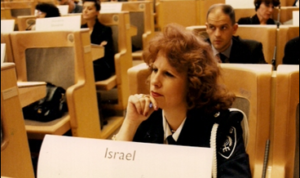
Let me tell you two stories: in 1977 Egypt’s President Anwar Sadat arrived in Israel on a historical visit, during which he held a speech at the Knesset. Egypt, an enemy state in the Middle East came to make peace with Israel. Preparing for such an event usually requires at least three months but in this case everything was a surprise and had to be kept as a secret! We had to prepare everything within less than one week – sounds like a mission impossible, but we succeeded.
The second story is about Israel’s Prime Minister and Minister of Defense, Yitzhak Rabin who was assassinated in 1995. The Knesset had to prepare the venue for the public ceremony where we expected a large crowd come and pay respect at the casket. The entire country was in shock, me included.
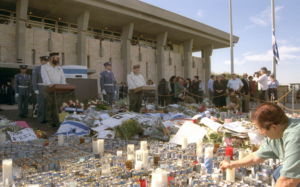
I personally knew Mr. Rabin. I had to hold back all my sadness and grief to be capable of doing my job as we had no choice. Me and my team organised the funeral within a few hours (!) and welcomed thousands of people, delegations, congregations from all over the world. This was probably my hardest day ever.
Q: What would you personally suggest all women out there wishing to work in diplomacy and protocol in a leading position? What to study, and strive for when preparing? Could you give 5 pieces of practical advice for them?
I can confidently say from my personal experience that women who wish to work in protocol and diplomacy, first and foremost, they must have strong decision-making and project planning skills. Then there are other significant areas to be covered such as organisational and communication skills, plus they need to be able to work both independently and in a team – even around the clock, if required.
But most importantly, they must love this profession to do it with full dedication and passion. You won’t last without!
Q: With such an extraordinary background, what are your future plans? How do you spend your days after the retirement?
Certainly, I have plans – I would like to enjoy my “freedom” and spend time with my family: my husband, our three children and five grandchildren. I am also planning to publish another book “Behind the Scenes” on Knesset ceremony and protocol. After that I’d love to teach and share my work experience with new generations to come. I am also thinking of volunteering to contribute to the community and the empowerment of women.
My dream is to participate in writing the world’s first book of ceremonies with the UN. Israel’s 9th President, the Late Shimon Peres once said: “There’s no room for small dreams”. Well said!
Q: In your experience, what are the key components of the 21st century’s protocol that makes protocol a necessary tool in international relations?
The most important asset today is the ability to use advanced technology and multimedia communications. You also need to be aware of all social media networks, especially in the years of pandemic. Apart from the skills I mentioned earlier, it is essential to speak foreign languages – at least two, fluently.




